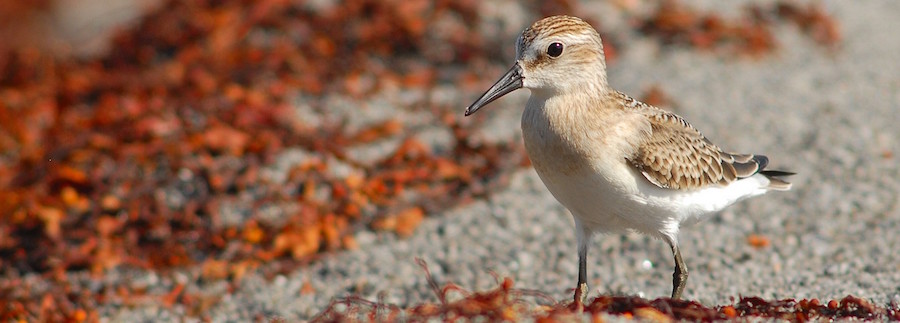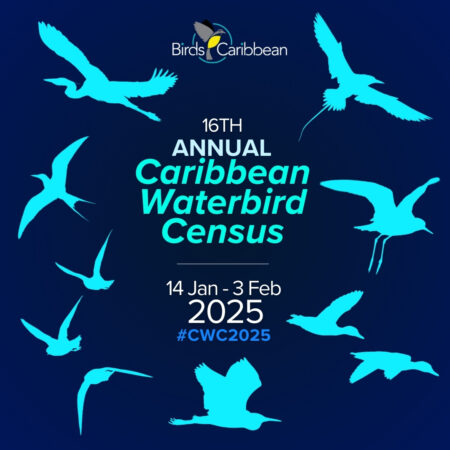
Caribbean Waterbird Census Program
The Caribbean is home to over 185 species of waterbirds (seabirds, wading birds, marsh birds, waterfowl and shorebirds), including a number of endemic and globally threatened species and many migrants. It is up to us to study, monitor and conserve these beautiful birds and the habitats they need to survive. The Caribbean Waterbird Census (CWC) Program—a partnership of Caribbean organizations, communities, and individuals that monitor waterbirds—was set up to do just that.
 For information on how to participate in the 2025 CWC, click here.
For information on how to participate in the 2025 CWC, click here.
You can find more information and promotional graphics for 2025 here in our blog post. Scroll down this page for links to access resources and reports.
The places that are important to waterbirds are also important to people. Wetlands, including mangroves, salt ponds, sandy beaches, mud and tidal flats, provide natural flood control, protection from storms, and a sustainable food supply, thereby supporting economies and tourism. Keeping these places safe and healthy helps to protect birds and people.
About the Caribbean Waterbird Census (CWC)
The CWC is a multi-partner region-wide waterbird and wetland monitoring program led by BirdsCaribbean. The goal of this program is to learn more about the distribution, status, and abundance of waterbirds in the Caribbean in order to better conserve and manage these beautiful birds and their habitats. We also aim to increase awareness, build capacity, and engage non-governmental organizations, government agencies, communities, and volunteers in wetland monitoring and conservation. Ultimately, we want to identify and ensure that as many important wetland sites as possible are conserved.
Why Count Waterbirds?
Throughout the Caribbean, wetlands—and the birds that rely on them—are in urgent need of conservation action. Many of the region’s original wetlands have been destroyed, and those that remain are increasingly encroached upon by development for tourism, housing, agriculture or industry. In addition, waterbird populations are also subject to hunting, egg and chick harvest, and predation by introduced invasive species such as rats, cats and mongoose. Increased frequency of storms and sea level rise due to global climate change, also threaten wetland habitats and waterbird populations, but the effects are not yet well understood. Monitoring the health of waterbird populations and their habitats is beneficial to both birds and people, since we rely on the same habitats for our health and well-being. The CWC is part of the global International Waterbird Census (IWC), one of the largest and longest running monitoring programs in the world.
When is the CWC Held?
Each year, BirdsCaribbean organizes one region-wide count during a 3-week period from January 14th to February 3rd. This provides us with a “snapshot” of waterbird population numbers and habitat use throughout the Caribbean. Data from these counts also shows us which areas they depend on most and how their populations change from year to year. To learn more about migration routes and important stopover sites, everyone is asked to count waterbirds as often as possible throughout the year, especially during migration periods in fall (August-November) and spring (March-May).
Get Involved!
We need your help to monitor more sites and conduct more frequent counts at new and existing sites! The CWC is designed so that at the basic level anyone—from professional biologists to citizen scientist volunteers—can implement the program and contribute to monitoring. All are welcome to be part of the program. To learn how to participate in the CWC, click here. Download our CWC Fact Sheet: English (PDF) – Español (PDF)
Quick Links: Results from the CWC and Resources
Link to CWC 2025 blog and resources, including free downloadable promotional graphics.
Learn more about Caribbean shorebirds in our short (2 minute) videos about shorebirds, their diversity, what threatens them, the importance of the Caribbean as shorebird habitat, spotlight on the Lesser Yellowlegs, a declining species; and the impacts of shorebird hunting. Videos are available in English, Spanish and French.
Identification of priority shorebird conservation areas in the Caribbean – Paper by Jessica Cañizares and Michael J. Reed published in peerj.com
